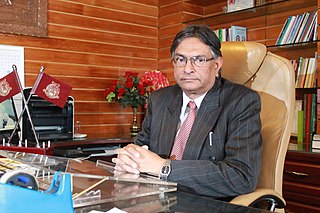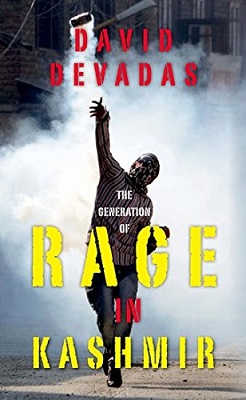
Markazu Saquafathi Sunniyya, also known as Markaz is a nonprofit organization in India, which administers educational and charitable institutions throughout the country. Its head office is located in Kozhikode city. It was established in 1978.

Jamia Millia Islamia is a public and research university located in Delhi, India. Originally established at Aligarh, United Provinces during the British Raj in 1920, it moved to its current location in Okhla in 1935. It was given the deemed status by the University Grants Commission in 1962. Jamia Millia Islamia became a central university by an act of the Indian parliament which was passed on 26 December 1988.

Mukhtar Ahmed Ansari was an Indian nationalist and political leader, and former president of the Indian National Congress and the Muslim League during the Indian Independence Movement. He was one of the founders of Jamia Millia Islamia University. He remained it's chancellor from 1928 to 1936.
Mushirul Hasan was a historian of modern India. He wrote on the partition of India, communalism, and on the history of Islam in South Asia.

Syed Asghar Wajahat, popularly known as Asghar Wajahat, is a Hindi scholar, fiction writer, novelist, playwright, an independent documentary filmmaker and a television scriptwriter, who is most known for his work, 'Saat Aasmaan' and his acclaimed play, 'Jis Lahore Nai Dekhya, O Jamyai Nai', based on the story of an old Punjabi Hindu woman who gets left behind in Lahore, after the Partition of India, and then refuses to leave.

Najeeb Jung is a retired Indian Administrative Service officer who served as the 20th Lieutenant Governor of Delhi from July 2013 to December 2016. He previously served as the 13th Vice-Chancellor of the Jamia Millia Islamia from 2009 to 2013.
Riyaz Punjabi was a professor and vice chancellor at the University of Kashmir. He was granted the Padma Shri, one of India's highest civilian awards, in 2011. In 2008 he was granted an honorary professorship at the International University Vienna for his contribution in "Strengthening International Relations in the Sphere of Education". He also won the Amity Academic Excellence Award from Amity International Business School, in 2009, the Fazil Memorial Award in 2009, and the Adbi Markaz Kamraz award in 2010. He died on April 8, 2021.

Talat Ahmad is an Indian Earth Scientist, former Professor at the Department of Geology, University of Delhi and served as Indian National Science Academy (INSA) Senior Scientist. He served as Chairman of Governing body which oversees Wadia Institute of Himalayan Geology, Dehradun from 1 November 2021 onwards and served the office till 31 October 2027. Previously, he commenced his second stint as Vice-Chancellor of University of Kashmir on 6 August 2018 and served the office till 20 May 2022. Before that, he served as Vice Chancellor of Jamia Millia Islamia, he resigned from the post a few months short of his full term. He was shortlisted by a committee constituted by the governor to shortlist a panel for the post. He had earlier taken over as Vice-Chancellor of University of Kashmir from Professor Riyaz Punjabi on 1 June 2011 and served there until the year 2014. Prior to this, he was teaching Geology at the University of Delhi.
Hindol Sengupta is an Indian historian, academic, and journalist. Sengupta lives in Delhi and is professor of international relations at O. P. Jindal Global University. He has been Vice President, Invest India, the national investment promotion agency of the government of India, and Editor-at-Large at Fortune India where he writes a weekly column. He is also a columnist for Aspen Italia and The New Indian Express.

Kishalay Bhattacharjee is an Indian, senior journalist, columnist and author.
Ajay Navaria is an Indian writer and scholar, born in Dausa, Rajasthan, India. Navaria's work is specifically in the genre of short stories and novels. He currently holds the position of Associate Professor of Hindi Literature at Jamia Millia Islamia in New Delhi.

In Search of a Future: The Story of Kashmir is a book written by Indian journalist and author David Devadas, first published in 2007 by Viking Penguin. The book discusses the history of Kashmir, starting with the revolt of the Muslim majority populace against their ruler, and traces the roots of the insurgency in the state of Jammu and Kashmir. Devadas spent about 9 years researching the book.

The Generation of Rage in Kashmir is a book written by the Indian journalist and author David Devadas, a former political editor at Business Standard. The book examines the rise of militancy in Kashmir and looks at the causes of anger among Kashmiri youth following the killing of Burhan Wani in 2016.
Student violence has become a serious issue for universities and colleges of India. The type of student violence can vary from political rivalries to shootings to sexual harassment.

The Jamia Millia Islamia attack refers to the forceful entry by Delhi police into the Jamia Millia Islamia university during a confrontation with student protesters that started outside the campus on 15 December 2019. Hundreds of police officers forcefully entered the campus and detained more than a hundred students during the confrontation with the protesters. The police used batons and tear gas to disperse protesters. The police also entered the university library and washrooms and in the process of the violence ransacked parts of it. The visuals of students being dragged and assaulted by the police were telecast by news channels. About two hundred people were injured and were admitted to AIIMS and the Holy Family Hospital.

Abdul Lateef Azmi was an Urdu litterateur and among the close associates of the founders of Jamia Millia Islamia. He joined Jamia Millia as a student of B.A. in 1936 and served the university over 50 years in various capacities. He was one of the longest serving editors of Jamia Millia's official magazine, Jamia. He died in Delhi on May 11, 2002. In 1985, Maktaba Jamia, New Delhi, published a book Abdul Lateef Azmi Hayat-o-Khidmat. Several scholars contributed chapters in the book on various facets of Abdul Lateef Azmi and his life.

The life and times of George Fernandes is a biographical book about George Fernandes which is written by Rahul Ramagundam. The book is published by Penguin Random House India. The First Post wrote, "Rahul Ramagundam, who wrote Gandhi’s Khadi (2008) and Including the Socially Excluded (2017), is out with his new book The Life and Times of George Fernandes (2022). Published by Penguin, it is a biography of a trade unionist who became a parliamentarian and minister. Fernandes was often embroiled in controversy for the decisions he made and positions he took. The author, who is an Associate Professor at the Centre for the Study of Social Exclusion and Inclusive Policy at Jamia Millia Islamia, New Delhi, attempts to unpack various facets of the man’s life."

Students and artists created art and graphite paintings on the walls and roads of the Jamia Millia Islamia campus in New Delhi, India, following the 2019 Jamia Millia Islamia attack by Delhi Police in December 2019. The protest art spread into the neighborhood of Shaheen Bagh and their protests, and continued to be created until January and February 2020.

Kunal Majumder is an Indian journalist and academic. He investigates and documents issues related to press freedom and advocates for journalist safety as India's representative at the Committee to Protect Journalists.














